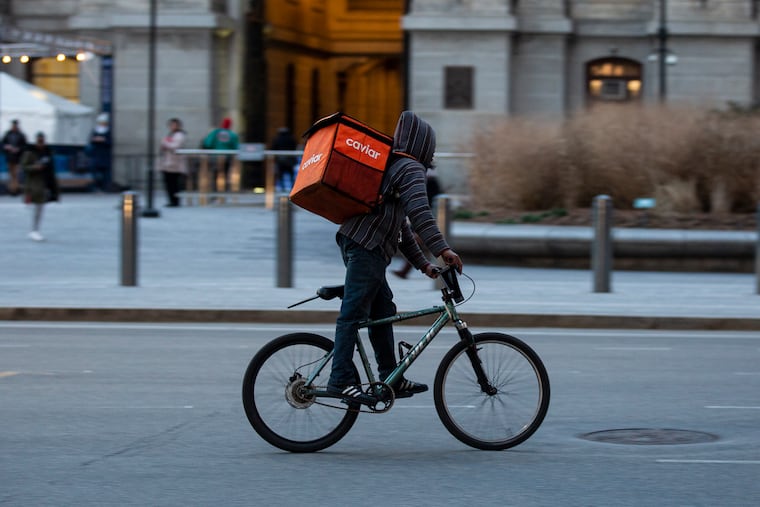DoorDash is the fastest growing meal delivery business during coronavirus lock down
While restaurants have been hit hard during the coronavirus pandemic, the meal-delivery start-up DoorDash has used the crisis to grow.

DoorDash, after overtaking Grubhub 10 months ago to become the nation’s top meal deliverer, extended its lead during the current lockdown, new data show.
Its revenue grew 21 percent in March compared with the previous month, according to data compiled by Second Measure, a California firm that analyzes credit-card purchases.
Delivery firms make money by charging restaurants fees for joining the firms’ networks and for getting meals to customers. The firms also charge the diners for the delivery.
One reason for DoorDash’s growth was its purchase last year of Caviar, which focused on higher-end restaurants. Another contributing factor was that it cut commissions for many restaurants by at least 50%. Because restaurants typically run on low margins, every dollar counts.
Barb Stuckey, the president and chief innovation officer for Mattson, a company known for food and beverage development, noted that most restaurateurs have seen revenue plummet 80 percent since sales were limited to deliveries or pickups. “It’s a struggle,” she said.
Grubhub did announce it would defer part of the commission that it charges restaurants. However, the eateries remain on the hook to pay that money back later. In effect, Grubhub is providing short-term loans.
“I think even deferring payment of the commissions may not be enough,” Stuckey said. “Restaurants are struggling so much.”
It appears that neither DoorDash nor Grubhub is making a profit. GrubHub, founded in 2004 in Chicago and publicly traded, reported a $6.3 million loss on revenue of $1.3 billion last year. It went into the red in the fourth quarter of the year, perhaps reflecting its fight with DoorDash. Its stock, which hit a high of about $86 last year, closed trading Monday on the New York Stock Exchange at $46.68, up 7.3%.
DoorDash, founded in 2013 in San Francisco, is privately owned but has filed paperwork to go public. It was expected to lose $450 million on revenue of $900 million to $1 billion in 2019, according to a report in the Information, a San Francisco-based website that covers tech.
DoorDash did not respond to messages seeking comment.
A New York Times analysis of meal delivery charges found that the cost of a typical meal from Subway as delivered by DoorDash was 17 percent more expensive than the same meal delivered by Grubhub. Both assessed roughly the same delivery and service fees, but DoorDash ended up costing more because the price for the meal itself was higher for delivery customers than in the restaurant.
Grubhub was Philadelphia’s largest food delivery service before March, when DoorDash took the number-one spot, according to Second Measure. However, DoorDash’s share also reflects its $410 million purchase last summer of a rival deliverer, Caviar, which seems to have been popular with local restaurants.
Commissions take a large cut of the bill, but can be worth the cost
Meal delivery commissions are the biggest complaint from restaurants. Matt Budenstein, co-owner and manager of Liberty Kitchen, a deli that opened in Fishtown last year, said having to pay a chunk of the bill in a low-margin industry really hurts. However, he said that the loss was offset by higher volume in sales.
Liberty Kitchen joined Caviar, now part of DoorDash, six months ago. Budenstein said home delivery started out slowly but has picked up since the shutdown. “It’s about half of our business now, it’s actually really helped us," he said. “It’s pretty much saved us, honestly.”
Grubhub provides a one-page breakdown to restaurants showing how much commissions can cost. In the example, for a hypothetical taco meal, a restaurant retains $30.33 on a $41 order, after a 20% marketing fee ($8.20), 10% delivery fee ($4.10), and a 3.05% + $0.30 processing fee ($1.65).
However, Grubhub also says marketing commissions are negotiated based on how much promotion a restaurant wants Grubhub to provide and the 10% delivery commissioned is waived if the restaurant handles delivery itself.
“The average marketing commission is around 15 percent, and restaurants can choose to spend more if they believe it will drive more orders to them,” said Katie Norris, a Grubhub corporate communications manager.
» HELP US REPORT: Are you a health care worker, medical provider, government worker, patient, frontline worker or other expert? We want to hear from you.
Having a third party handle the logistics of delivery also provides a restaurant some benefits. Budenstein said it would cost more money for them to handle delivery in-house and Caviar covers a larger service area. “We’re in Fishtown, and we can deliver all the way to South Philly,” he said.
DoorDash’s increase in business is apparent on its website. As of last week, 407 of the 1,670 restaurants on DoorDash in the Philadelphia region, which includes surrounding counties, had no reviews. It is described as “Newly Added.” And 368 more had between one and 10 reviews. That means 46% of restaurants around Philly have 10 or fewer reviews.
Meal delivery companies, much like ride-share companies such as Lyft and Uber, have been criticized for hiring workers as contractors instead of employees. That saves the companies money, but means workers are not eligible for paid sick leave, among other benefits. Critics says this is especially dangerous at a time when the nation is trying to limit the spread of coronavirus. In California, the legislature has passed a law to force companies to treat more workers as employees.
Last year, in another controversy, DoorDash apologized and changed its practices after it became public that it was paying drivers less money when customers tipped them.
Also last year, the Philadelphia-based Tiffin Indian food restaurants sued Grubhub, alleging it was charging the chain for phone calls placed to restaurants that did not result in food orders. In December, over the restaurants’ objections, a judge ordered the case to go into arbitration.